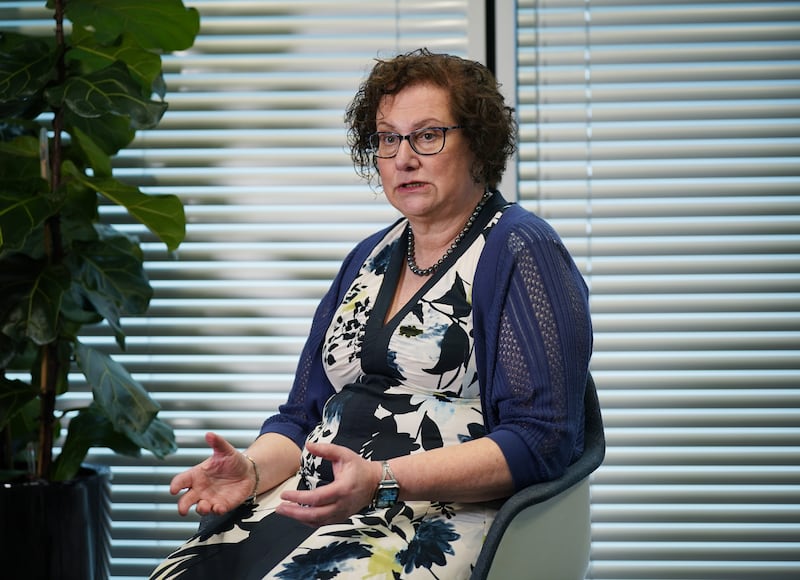Concerns have been raised that gender-questioning young people are being failed by “appalling” waiting lists as a report warned that staffing is one of the “most challenging” parts of delivering their care.
Some 250 patients were transferred to the care of two new regional hubs when the Gender Identity Development Service (Gids) run by the Tavistock and Portman NHS Foundation Trust closed at the end of March.
Around 5,000 more children and young people are currently on the waiting list for referral into the new clinics.
The waiting list time at Gids had grown to more than two years for young people to get a first appointment.
NHS England has acknowledged “challenges” in staff recruitment to new services but said these are a “top priority” in order to tackle waiting times.
Asked for the current waiting time, it said it could not confirm as the new services “are still being established and expanding”.
In her final report, Dr Hilary Cass said that before the new clinics opened, the “vast majority of gender-questioning children and young people who seek help from the NHS have been referred to a highly specialised workforce working solely in gender care”.
While she said a smaller number had been “successfully supported” in local Child and Adolescent Mental Health Services (CAMHS) or paediatric services, the previous approach had generated “unmanageably long waiting lists”.
She has called for a more holistic approach, with care that “considers the child as a whole person and not just through the lens of their gender identity”.

Mermaids, a transgender youth support charity, said the NHS was “failing trans youth, with appalling waiting lists”, and amid “increased politicisation of the support offered to children and young people”.
The organisation said it was “pleased the voices and experiences of trans young people appear to have been heard and respected” in the review.
But they raised concerns that some of the report’s language could be “open to misinterpretation and could be used to justify additional barriers to accessing care for some trans young people” adding that they would publish their full analysis of the review “in due course”.
NHS England said it had already put in place “enhanced mental health support” for all those under 18 on the waiting list as well as those awaiting their first appointment with the new services.
It has also asked local NHS leaders to instruct that all first appointment offers to adult gender clinics for young people before their 18th birthday should be paused in light of the review.
Dr Cass has recommended “follow-through” services for 17-25-year-olds instead of them being directly transferred into adult clinics.
She said her review “recognises that workforce shortfalls are one of the most challenging aspects” of delivering care as she called for “broad multi-professional” staffing in the regional centres, to include psychiatrists, paediatricians, clinical nurse specialists, social workers and specialists in autism as well as speech and language therapists.
She said she had found it “very distressing” that some people are “sitting on a waiting list, not knowing what’s going to happen to them, not knowing where to get information, and feeling really isolated”.
She said the issue will not be fixed “overnight” as there are already “significant workforce issues” across paediatrics and child mental health, but added: “I hope we can start to make steps in that direction.”
While professionals have been anxious about what the appropriate course of action is in treating gender-questioning children and young people, she said she hopes that, through her review, “more people will be encouraged to come into this area and see it as important”.
NHS England, in a letter to Dr Cass outlining its next steps following her report, said helping the new clinics to “overcome challenges around staff recruitment will be a top priority as this will determine the pace at which they will be able to see new patients from the waiting list in addition to supporting the care of all those patients who have been transferred” from Gids.
The two new hubs are led by London’s Great Ormond Street Hospital and Alder Hey Children’s Hospital in Liverpool, and NHS England hopes they will be the first of up to eight specialist centres as part of the north and south hubs over the next two years.
A spokesperson for the London hub said: “We have already begun seeing the first children and young people.
“Our service is built around supporting the whole person, considering their physical and mental health, including emotional, psychological and social needs.
“We want to understand the individual needs of children and young people, and draw on a broad team of professionals, who work with them to provide safe, appropriate care.”
They said they will be “closely following NHS England guidelines informed by Dr Cass’s interim report”.
NHS England said that by June it will publish the service specification defining access into the new children and young people’s gender services.
The NSPCC said access to “timely, high quality, evidence based care” is crucial for young people.
Sir Peter Wanless, the organisation’s chief executive, said: “It is incredibly important that the evidence and insights of the Cass Review are digested in full and the needs and experiences of children and young people remain front and centre of the response to it.
“Every child’s experience of dealing with issues around their gender identity will be different and it is crucial that every young person who requires it has access to timely, high quality, evidence-based care where they are heard, feel safe and supported.
“At Childline, we know how difficult it can be for young people questioning their gender identity and we will always be here to listen and help children in a confidential, non-judgmental way.”
For more information visit www.childline.org.uk.



